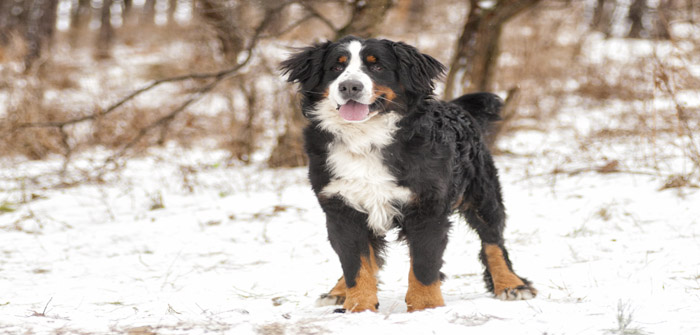As winter settles in and temperatures drop, it’s important to keep dogs happy and healthy – especially older dogs who may not be as active and rely less on play or exercise to stay warm.
With this in mind, Sean McCormack, head vet and Carolyn Menteith, behaviourist at Tails.com, have offered their top tips and advice for managing senior dog’s wellbeing, as well as some of the challenges that they may face during the winter months.
Mr McCormack has revealed some of the common challenges that senior dogs may face during cold spells of weather:
Arthritis and joint pain
When the weather gets colder, joints can become stiffer for many older dogs, or arthritis may worsen. This is because the drop in temperature can cause muscles and joints to become less flexible, leading to discomfort and making movement painful and difficult.
Hypothermia and poor temperature regulation
Some senior dogs have a harder time regulating their body temperature when cold snaps hit the UK. As dogs age, their coats may become thinner, and they may have reduced body fat or weakened metabolisms, which makes it harder for them to stay warm.
As a result, older dogs are more susceptible to conditions such as hypothermia or frostbite. While temperatures in the UK rarely drop to levels that can cause these problems, it is still important to be aware of the risk, especially as we are now in the height of winter.
Weakened immune system
As our dogs age, much like humans, their immune systems may not be as strong as they once were. This means they can be more vulnerable to infections, including respiratory illnesses, during colder weather.
Reduced energy and fatigue
You may also notice that during colder temperatures, your senior dog appears more lethargic and less inclined to play or go for walks. This can be challenging, as reduced movement may cause mobility issues to worsen or lead to weight gain due to a lack of physical activity.
Slips and falls
Snow and ice on the ground during colder months can make all dogs more susceptible to slips and falls. However, for senior dogs, slippery roads and pavements are especially dangerous. Weaker muscles, brittle bones, and balance problems increase the risk of falls, as their reflexes may be slower and more limited.
During the colder months, there are a lot of challenges you need to consider, so how can you make sure that your older dog remains happy and healthy during winter? Below, Carolyn Menteith, behaviourist at Tails.com, has given her top tips:
How can you manage your senior dog’s wellbeing during cold spells of weather?
Every dog, like us, is unique, and different breeds and types respond differently to the cold. Some seniors will continue to whizz around as usual, taking the cold weather in stride, while others will prefer to spend the day snuggled up in a duvet. Be guided by your dog.
If they are just as keen to ‘get out there’ as they always are, wrap up warm and go with them!
Be careful of slippery, icy surfaces, try not to walk where roads or pavements have been salted (as this can cause irritation or severe skin complaints), and keep a close eye on them to make sure they are not getting cold. Keep these walks short and close to home, because no matter how enthusiastic they are at first, a senior dog can quickly relax.
If, however, they seem stiff, lethargic, or just unwilling to move far from their bed, that is absolutely fine. Make sure they have a comfortable bed near you, away from draughts, and with enough blankets to keep them warm and cosy.
What can you do to ensure that your dog stays mentally stimulated without going outside on really cold days?
All dogs need mental enrichment as well as physical exercise, and so on really cold days when neither you nor your dog want to venture out, you can increase this part of your interactions with your dog. This can mean gentle play, practising some training exercises (if your dog enjoys this), or using treat dispensing puzzles like lick mats or snuffle mats, for example.
For those dogs that enjoy being groomed, brushing them and spending quality time with them is often just as good as going for a walk.
What about if your dog stops eating or their appetite decreases?
If your dog is doing less exercise, there is the possibility they might eat less, but you will know if this is usual for your dog or not. Any unusual changes to your dog’s eating habits should be investigated by your vet immediately.
What else do you need to consider when it comes to caring for senior dogs during the winter?
While you don’t have to venture out on the wildest or coldest winter days, your dog still needs your attention and love. If you are not spending dedicated time walking them, you need to replace this with gentle play, mental enrichment, and your company.


